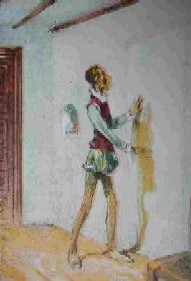Great books . . . That night the housekeeper burned to ashes all the books that were in the . . . house. Some must have been consumed that deserved preservation in everlasting archives, but . . . in them was verified the proverb that the innocent sometimes suffer for the guilty. One of the remedies which the priest and the barber immediately applied . . . was to close off and wall up the room where the books were.

SLU honors great books
I finally retired from teaching in 2016, but I’ve left this page here because this work gave me great pleasure and made me proud to be a school teacher. It wasn’t your mother’s great books course. The books were modern, and the syllabus changed every year. (Syllabi are listed below).
For eleven years, from 2005 until 2016 I had the privilege of offering a senior honors seminar at Saint Louis University. It wasn’t a traditional Great Books, course, as I’ve said; if I had tried that I’d have faced the fact that my students had already read and digested most of the books on the syllabus before, some of them in high school. That wouldn’t necessarily have beeen bad, but it would have made of the class a different kind of work from the work I thought the course should enable.
I’m aware of several arguments I might have had with colleagues and students about whether the books I chose were “great,” but these never seemed fruitful to me. I chose books I thought have something to teach about the moral and spiritual universe we inhabit as humans in the twenty-first century, and not as a secondary thing, have an ability to suggest connections between thoughts and other thoughts, between thought and the world. I thought of this work as an affirmation of the American tradition of liberal education. I inherited the course from another faculty member, and continued to use the Great Books appellation because the Great Books idea opposes itself to literary criticism. Sometimes even bad books stimulate good conversation.
A book’s relation to a critical paradigm may be an important fact, useful to perceive and understand; but in a Great Books class one has the privilege of inquiring what the books one reads may have to teach; and the results of that inquiry may not be the same for all. Indeed the Great Books idea provides a space to encounter worthwhile books in conversations that may extend beyond the classroom.
In 2015 for the first time, I offered the course in a one-semester format. That format didn’t leave room for some of the long books I had used in the past; though the reading list was still challenging. The writing requirement remained substantially the same, with a weekly essay. Because we met every week, the course was a bit more intense, but I think we retained the atmosphere and practice of free and open discussion that had characterized the course in the past.
Syllabi from past years: 2005—2006 | 2006—2007 | 2007—2008 | 2008—2009 | 2009—2010 | 2010—2011 | 2011—2012 | 2012—2013 | 2013—2014 | 2014—2015 | Fall, 2015 | Spring, 2016
UNT great books
This was a stand-alone program at the University of North Texas from 1972 until 2002. In each of two semesters students enrolled at once for nine credits (three in philosophy, three in literature, and three in history), for a total of eighteen credits. All classes were attended by three professors as a faculty team, and were conducted in seminar fashion. In the course of its history the course was led by a good many different faculty teams. I was part of it for several years in the early 1990s.

Pingback: no continuing city | out the backroom window